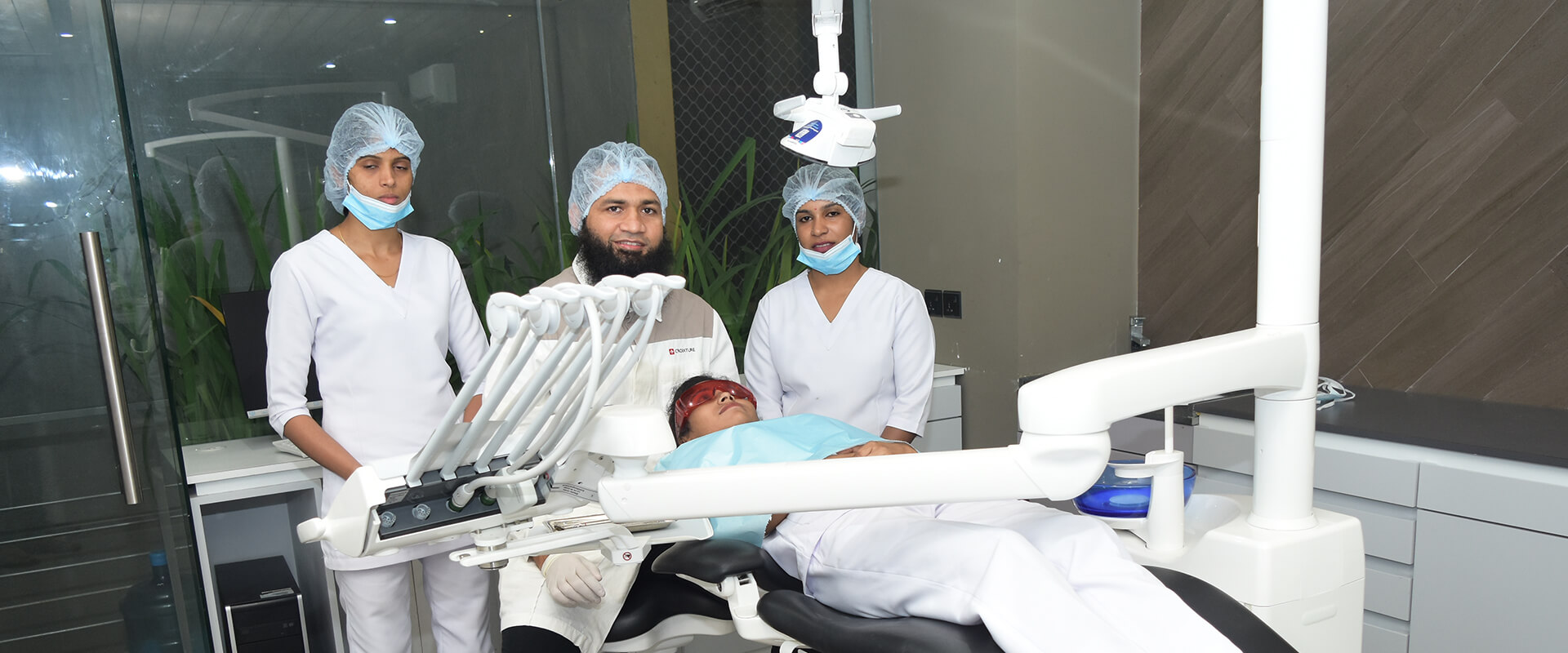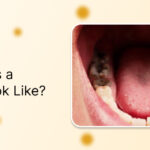What Does a Cavity Look Like?
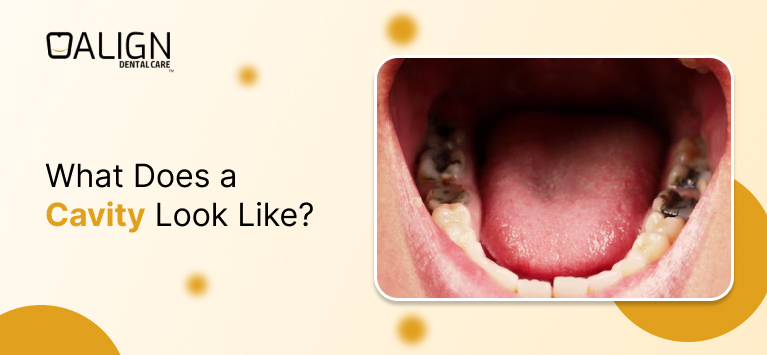
Cavities, also known as dental caries, are permanently damaged areas in the hard surface of your teeth that develop into tiny openings or holes. They are among the world’s most common health problems and can affect anyone with teeth, from infants to older adults. Understanding what a cavity looks like, how it feels, and the stages of its development is crucial for maintaining optimal oral health. In this blog, we will explore the appearance and sensation of cavities, their formation, treatment options, home remedies, and preventive measures.
Cavities can appear differently depending on their location and severity. Here’s how they typically appear:
What Does a Cavity Look Like When It First Starts?
Early Stages of Cavity:
In the initial phase, cavities may appear as small white or chalky spots on the enamel, a process known as demineralization. This occurs when bacteria in the mouth produce acids that erode the minerals in the tooth. At this stage, cavities are painless and easy to overlook. However, early intervention with fluoride treatments and proper oral hygiene can help remineralize the enamel and stop the decay from progressing. This phase is often referred to as the beginning stages of tooth decay.
What Does Tooth Decay Look Like?
Progression of a Cavity:
As the decay advances, the initial white spots on the enamel may darken, turning brown, black, or gray. This indicates further mineral loss and enamel breakdown. Small holes or pits begin to form, making the cavity more noticeable.
A small cavity may first appear as a tiny dark spot on the tooth surface, often unnoticed without a dental examination. If left untreated, the decay penetrates deeper, reaching the dentin (the softer layer beneath the enamel). At this point, you may start experiencing tooth sensitivity. Eventually, the cavity can spread to the pulp, leading to pain, infection, and the risk of tooth loss.
How Does a Rotten Tooth Look Like?
Advanced Stages of Cavity:
In severe cases, the tooth may appear visibly damaged with large holes, significant discoloration, and even fractures. The decay can reach the tooth’s inner layers, leading to infection and abscess formation.
What Does a Cavity Look Like on a Molar?
Cavities on molars often appear as dark spots, small holes, or pits on the chewing surfaces. Since molars have deep grooves, food particles and bacteria easily accumulate, increasing the risk of decay. These cavities may start as minor discoloration but can grow larger over time if untreated.
What Does a Cavity at the Gum Line Look Like?
Cavities near the gum line, also called root cavities, appear as notches, grooves, or small holes at the base of the tooth. They can cause gum irritation and sensitivity, especially when consuming hot, cold, or sweet foods. These cavities are more common in people with receding gums, as the exposed root surface is more vulnerable to decay.
What Does a Cavity Under a Crown Look Like?
Decay under a dental crown may not always be visible but can lead to discomfort, sensitivity, or even a foul taste in the mouth. Over time, bacteria can seep under the crown, causing the underlying tooth structure to weaken. Regular dental check-ups and X-rays help detect hidden decay before it worsens.
What Does a Cavity Feel Like?
The sensation associated with a cavity varies based on its progression:
- Early Stages: Often asymptomatic, but some individuals may experience mild sensitivity to sweet, hot, or cold foods and drinks.
- Moderate Decay: Increased sensitivity and occasional toothaches, especially when chewing or biting down.
- Advanced Decay: Persistent pain, severe toothaches, and possible swelling or abscess formation.
How Cavities Are Formed?
Cavities result from a combination of factors:
- Plaque Formation: A sticky film of bacteria (plaque) forms on your teeth from consuming sugars and starches.
- Acid Production: Bacteria in plaque convert these sugars into acids, which begin to erode the tooth enamel.
- Enamel Breakdown: Continuous acid attacks cause the loss of minerals in the enamel, which weakens and develops cavities.
Signs of Dental Cavities
Recognizing the signs of cavities is vital for early intervention:
- Toothache: Unexplained pain or spontaneous toothaches.
- Sensitivity: Sharp pain when consuming hot, cold, or sweet substances.
- Visible Pits or Holes: Noticeable holes or pits in the affected tooth.
- Staining: Brown, black, or white staining on any surface of a tooth.
- Pain When Biting: Discomfort or pain when biting down.
Diagnosis: What Does a Cavity Look Like on X-Ray?
Dentists use X-rays to detect cavities that aren’t visible to the naked eye. On an X-ray, cavities appear as darker spots within the lighter shade of the tooth enamel. This contrast helps identify the extent and exact location of the decay.
Treatment Options
The treatment for cavities depends on their severity:
- Fluoride Treatments: In the early stages, fluoride can help restore enamel and reverse minor decay.
- Fillings: For more advanced decay, the dentist removes the decayed material and fills the cavity with composite resin, porcelain, or amalgam.
- Crowns: Severe decay may require a crown—a custom-fitted cap that covers and protects the damaged tooth.
- Root Canals: If the decay reaches the tooth’s pulp, a root canal may be necessary to remove infected tissue and seal the tooth.
- Extractions: When a tooth is extensively damaged and cannot be saved, extraction is performed to prevent the spread of infection.
Can a Cavity Heal on Its Own?
Once a cavity has progressed beyond the initial demineralization stage, it cannot heal independently and requires professional treatment. However, fluoride treatments and improved oral hygiene can sometimes reverse early-stage cavities.
Home Remedies for Early Cavities
While professional dental treatment is essential for advanced cavities, the following home remedies can aid in preventing and managing early-stage tooth decay:
- Oil Pulling: Swishing coconut or sesame oil in your mouth for 10-15 minutes daily may reduce bacteria.
- Aloe Vera: Applying aloe vera gel to the affected area can help inhibit bacterial growth.
- Clove Oil: Known for its analgesic properties, applying clove oil can alleviate pain associated with cavities.
- Garlic: Chewing raw garlic or applying garlic paste can be a natural antibacterial agent.
- Saltwater Rinse: Rinsing with warm salt water can reduce inflammation and kill bacteria.
Conclusion
Cavities start as small white spots and progress into dark holes if untreated. Early detection and proper oral care can prevent and stop decay from worsening. Regular dental checkups and good hygiene practices are the best ways to maintain healthy teeth.
10 Home Remedies for Tooth Cavities
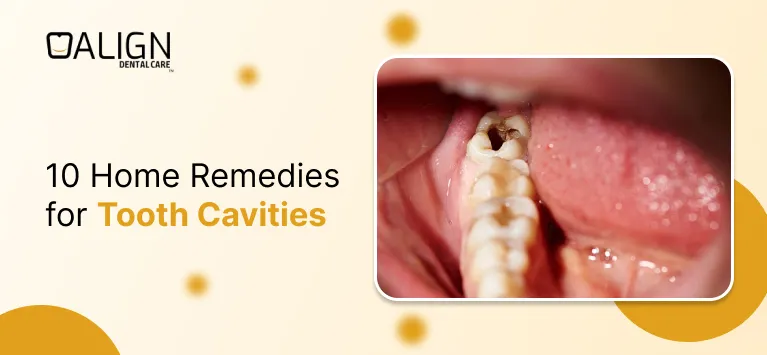
Tooth cavities, often resulting from tooth decay, are common dental issues that can cause discomfort and long-term damage if left untreated. While professional dental care is crucial for severe cavities, several natural remedies can help alleviate symptoms and slow down the progression of decay. Below are 10 effective home remedies to manage tooth cavities, written in a simple and easy-to-understand manner.
Home Remedies For Tooth Cavities
1. Saltwater Rinse

A saltwater rinse is one of the simplest ways to reduce pain and prevent further infection in a decayed tooth. Salt acts as an antibacterial agent and helps soothe inflamed gums.
- How to use: Mix half a teaspoon of salt in warm water, swish it around your mouth for 30 seconds, and spit it out.
- Benefits: Reduces bacteria, relieves pain, and prevents further cavity infection.
2. Clove Oil

Clove oil is a powerful natural remedy for toothache caused by cavities due to its antiseptic and pain-relieving properties.
- How to use: Apply a small amount of clove oil directly to the cavity using a cotton swab. Repeat this 2-3 times daily.
- Benefits: Helps treat a tooth cavity at home by reducing pain and inflammation.
3. Oil Pulling

Oil pulling is an ancient practice that involves swishing oil in your mouth to reduce harmful bacteria and promote oral health.
- How to use: Take a tablespoon of coconut oil or sesame oil, swish it in your mouth for 15-20 minutes, and spit it out. Rinse your mouth with warm water afterward.
- Benefits: Helps remove toxins and bacteria, acting as a home remedy for cavity removal.
4. Baking Soda Paste

Baking soda is an effective remedy to neutralize acids in the mouth and combat tooth decay.
- How to use: Mix baking soda with a small amount of water to form a paste. Apply it to the affected tooth and gently brush for 1-2 minutes before rinsing.
- Benefits: Assists in removing tooth decay and keeping cavities under control.
5. Garlic

Garlic has strong antibacterial properties that can help combat cavity-causing bacteria and relieve pain.
- How to use: Crush a garlic clove to make a paste, apply it directly to the cavity, and let it sit for a few minutes. Rinse your mouth thoroughly afterward.
- Benefits: Reduces bacteria and serves as an effective toothache decay treatment.
6. Aloe Vera Gel

Aloe vera contains antibacterial compounds that can fight cavity-causing germs and soothe irritated gums.
- How to use: Apply pure aloe vera gel to the cavity or affected area and leave it for a few minutes before rinsing.
- Benefits: Provides relief from pain and works as a treatment for tooth decay.
7. Neem Leaves

Neem is known for its antibacterial and anti-inflammatory properties, making it a traditional remedy for oral health.
- How to use: Chew on fresh neem leaves or use neem oil as a mouthwash to prevent tooth decay and cavities.
- Benefits: Helps in the treatment of tooth cavities and improves overall dental health.
8. Turmeric Paste

Turmeric is another powerful anti-inflammatory agent that can help soothe toothache and reduce bacterial growth.
- How to use: Mix turmeric powder with water or coconut oil to form a paste. Apply it to the affected tooth, let it sit for 5-10 minutes, and rinse thoroughly.
- Benefits: A natural way to fix a hole in a tooth naturally.
9. Green Tea

Green tea contains antioxidants that help reduce bacteria and inflammation in the mouth.
- How to use: Brew a cup of unsweetened green tea, let it cool, and use it as a mouth rinse twice daily.
- Benefits: Acts as a home remedy to remove tooth decay and improve oral health.
10. Hydrogen Peroxide Rinse

Hydrogen peroxide can help kill bacteria and reduce plaque buildup, which contributes to cavities.
- How to use: Mix equal parts of 3% hydrogen peroxide and water. Swish it around your mouth for 30 seconds and spit it out. Rinse your mouth with water afterward.
- Benefits: Provides a simple treatment for cavities and helps prevent further decay.
Additional Tips for Preventing Tooth Cavities
- Practice Good Oral Hygiene: Brush twice daily with fluoride toothpaste and use interdental brushes to clean between teeth.
- Avoid Sugary Foods and Drinks: Limit your intake of sweets and sodas to reduce cavity risks.
- Stay Hydrated: Drinking water helps wash away food particles and maintain saliva production.
- Visit Your Dentist Regularly: Professional cleanings and checkups are crucial for detecting and treating cavities early.
Final Thoughts
While these home remedies for cavity removal can provide temporary relief and slow down the progression of decay, they are not a replacement for professional dental care. If you experience severe pain or notice worsening symptoms, consult a dentist immediately. Combining these natural methods with good oral hygiene practices is the best way to get rid of cavities and maintain healthy teeth.
By following these remedies and tips, you can take control of your dental health and minimize the discomfort caused by cavities.
Rotten Teeth: Causes, Symptoms, Treatment, and Prevention
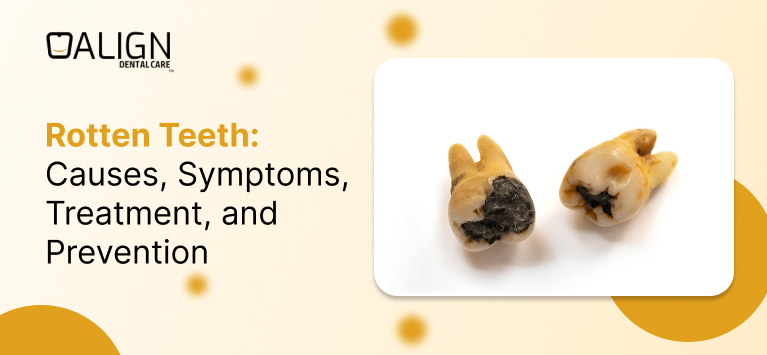
Rotten teeth are a serious dental problem that can affect people of all ages, including children. They result from advanced tooth decay and can cause pain, infections, and even tooth loss. In this blog, we will explore the causes of rotten teeth, their effects on both adults and children, detailed remedies, and ways to prevent them.
What Are Rotten Teeth?
Rotten teeth, also known as decayed or severely damaged teeth, occur when tooth enamel erodes due to bacteria and plaque buildup. This leads to cavities that, if untreated, worsen over time.
Rotten teeth can be easily identified by:
- Dark or black spots on the teeth
- Holes or visible decay
- Bad breath and sensitivity
- Pain and swelling in severe cases
Rotten Teeth Pictures
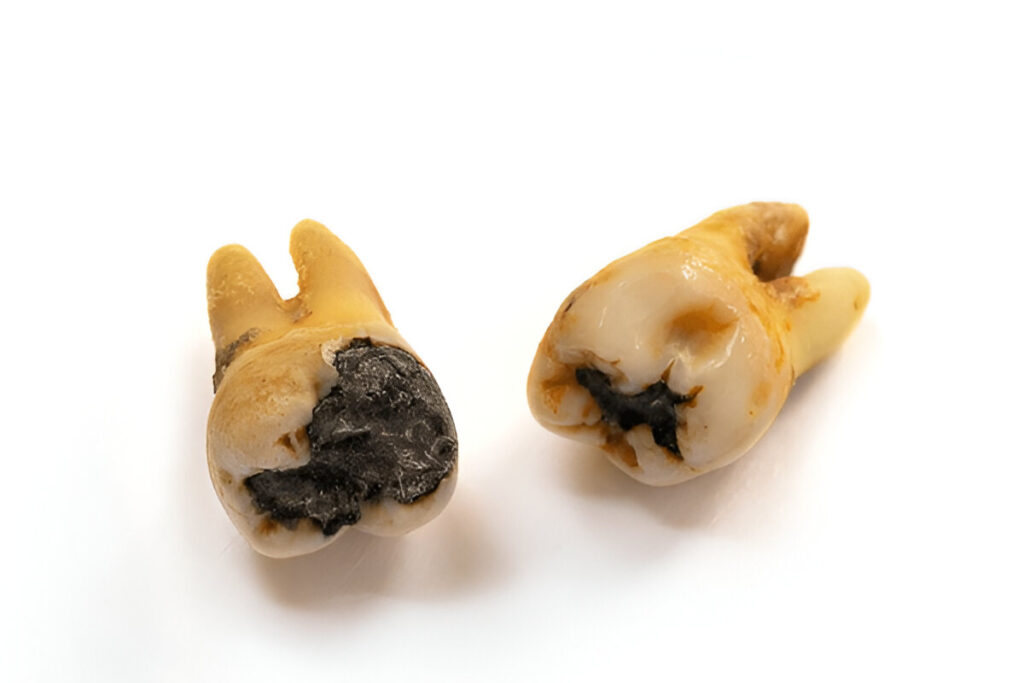
Causes of Rotten Teeth
Poor Oral Hygiene: Failing to brush and floss regularly allows plaque to accumulate, leading to decay.
High Sugar Consumption: Foods and drinks high in sugar feed bacteria in the mouth, producing acids that erode tooth enamel. This is especially common in children who consume sugary snacks.
Dry Mouth: A lack of saliva can make it harder for the mouth to neutralize acids and wash away food particles.
Skipping Dental Visits: Regular checkups and cleanings help detect and treat issues early.
Symptoms of Rotten Teeth
- Toothache or persistent pain
- Sensitivity to hot or cold foods and drinks
- Visible discoloration or black teeth
- Swelling and pus around the tooth
- Bad breath that doesn’t improve with brushing
Rotten Teeth in Toddlers
Toddlers are children aged 1 to 3 years.
What Causes Toddler Rotten Teeth?
- Prolonged bottle-feeding with milk or juice.
- Lack of brushing due to their young age.
How to Prevent Rotten Toddler Teeth
- Wipe their gums after feeding.
- Start brushing with a small, soft toothbrush as soon as teeth erupt.
- Avoid letting them sleep with a bottle.
Rotten Teeth in Toodlers Pictures
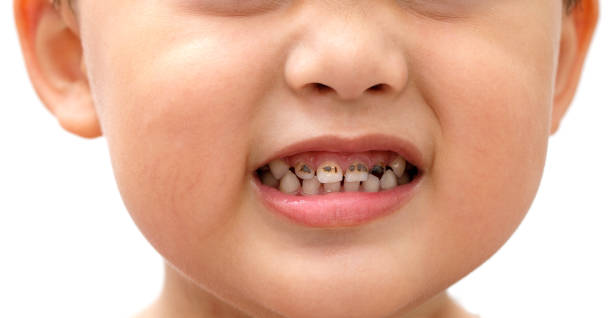
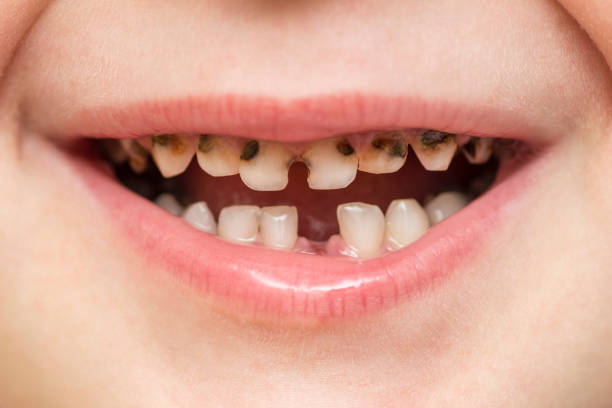
Rotten Teeth in Kids
Why Do Kids Get Rotten Teeth?
- Sugary Diets: Candy, sodas, and fruit juices are major culprits.
- Inadequate Brushing: Young children may not brush properly, leading to plaque buildup.
- Bottle Decay: Toddlers who fall asleep with milk or juice bottles can develop tooth decay, often called “baby bottle tooth decay.”
Effects of Rotten Teeth in Kids
- Pain and difficulty eating
- Speech development issues
- Impact on permanent teeth
Pictures of Rotten Teeth in Kids
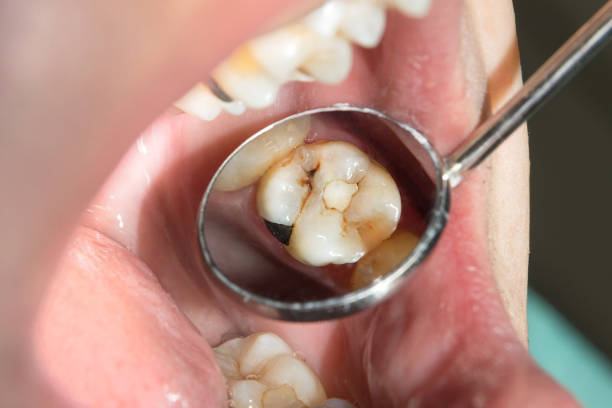
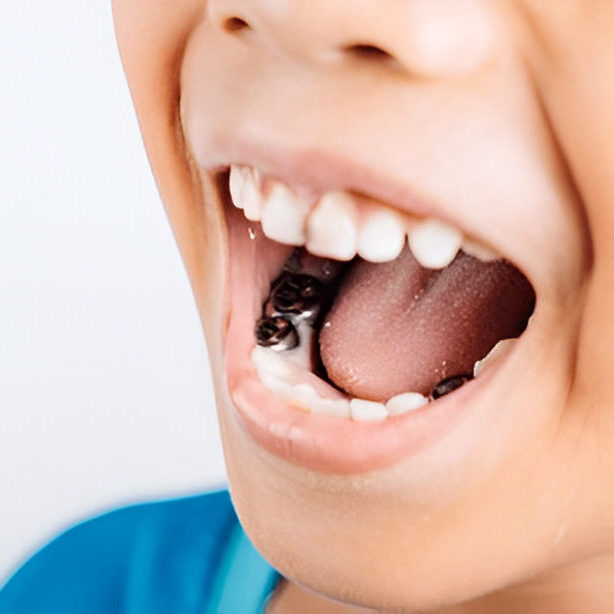
Rotten Teeth in Adults
Rotten teeth in adults refer to teeth that have experienced severe decay, often due to poor oral hygiene, high sugar consumption, or lack of regular dental visits. The decay begins when plaque, a sticky film of bacteria, builds up on the teeth and produces acids that erode the enamel. Over time, this can lead to cavities, pain, infection, and even tooth loss.
Rotten Teeth in Adults: Before and After Transformation
Rotten teeth images in adults before and after showcase the significant transformation that can occur with proper dental care and treatments.
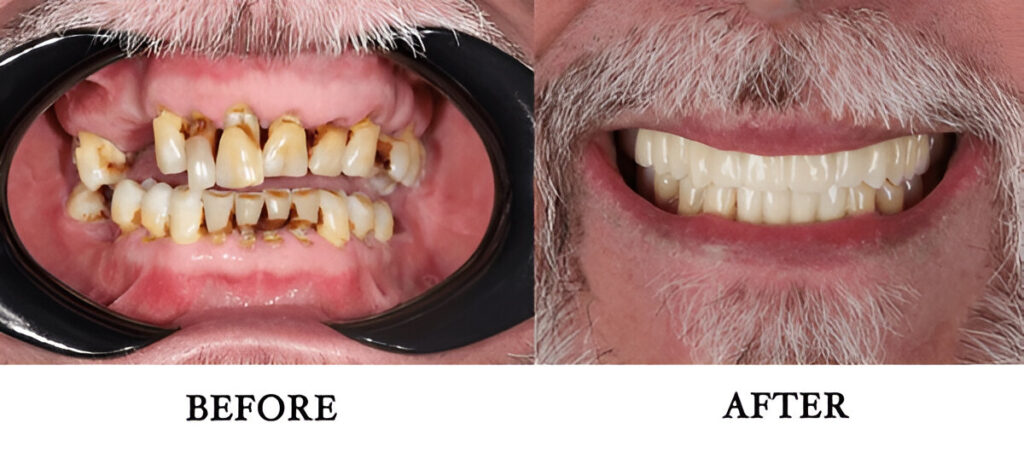
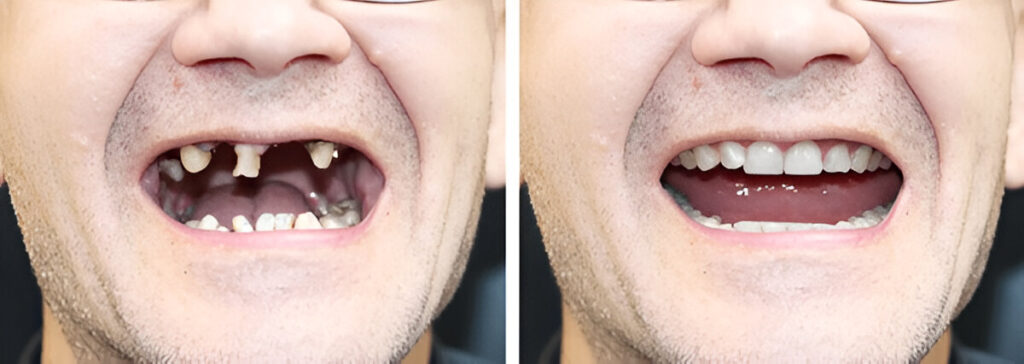
How Sugar Causes Rotten Teeth?
Sugar is a major contributor to tooth decay. When you consume sugary foods, bacteria in your mouth convert the sugar into acids. These acids attack tooth enamel, causing it to weaken and decay over time. Limiting sugar intake, especially in children, is crucial to preventing rotten teeth.
Home Remedies for Rotten Teeth
While professional treatment is necessary for severe cases, the following remedies can help manage pain and reduce decay progression:
Saltwater Rinse
- Mix 1/2 teaspoon of salt in warm water.
- Swish it in your mouth for 30 seconds, then spit.
- This helps reduce swelling and fights bacteria.
Clove Oil
- Apply a small amount of clove oil to the affected tooth using a cotton swab.
- Clove oil has natural analgesic and antibacterial properties to ease pain.
Garlic Paste
- Crush a clove of garlic and apply it to the rotten tooth.
- Garlic has allicin, which fights bacteria and reduces discomfort.
Hydrogen Peroxide Rinse
- Dilute 3% hydrogen peroxide with equal parts water.
- Rinse your mouth for 30 seconds, then spit.
- This reduces bacteria and helps clean the area.
Turmeric Paste
- Mix turmeric powder with a few drops of water to form a paste.
- Apply it to the tooth and leave it for a few minutes before rinsing.
- Turmeric has anti-inflammatory and antibacterial properties.
Treatment for Rotten Teeth
Rotten teeth can be treated effectively through various methods, depending on the severity of the decay. Let’s break down the most common options to help you understand what to expect:
Fillings: Repairing Small Cavities
What It Is: A dentist removes the decayed part of the tooth and fills it with materials like composite resin, amalgam, or glass ionomer.
When It’s Used: For mild to moderate decay that hasn’t reached the inner layers of the tooth.
How It Helps: Fillings stop further decay by sealing off the damaged area and restoring the tooth’s functionality.
Root Canal Therapy: Saving Severely Damaged Teeth
What It Is: This procedure involves removing infected tissue (pulp) from inside the tooth, cleaning the canal, and sealing it.
When It’s Used: For teeth with deep decay or infections that reach the tooth’s nerve.
How It Helps: A root canal preserves the tooth, preventing extraction and stopping pain caused by infection or inflammation.
Crowns: Restoring Strength and Appearance
What It Is: A crown, or “cap,” is placed over a severely damaged tooth to protect and restore its function and appearance.
When It’s Used: For teeth with large cavities or following a root canal.
How It Helps: Crowns strengthen the tooth and prevent further damage while improving its appearance. Materials like porcelain or metal are often used.
Tooth Extraction: Removing Irreparable Teeth
What It Is: When a tooth is beyond saving, it must be removed to prevent infection from spreading to surrounding teeth or gums.
When It’s Used: For teeth with extreme decay, severe infection, or structural damage.
How It Helps: Extraction eliminates pain and infection, creating space for replacement options like dental implants, bridges, or dentures.
Rotten Teeth Restoration: Cosmetic and Functional Repairs
What It Is: After decay is treated, restorative options like veneers, bonding, or dental implants can restore the appearance and function of your teeth.
When It’s Used: For enhancing the smile or addressing gaps and imperfections caused by decay.
How It Helps: These treatments ensure that treated teeth look natural and blend seamlessly with healthy teeth, improving confidence and oral health.
Prevention of Rotten Teeth
- Brush Twice Daily
Use fluoride toothpaste to strengthen enamel and remove plaque. - Floss Regularly
Flossing helps clean between teeth where toothbrushes can’t reach. - Limit Sugary Foods and Drinks
Avoid excessive sugar and encourage healthier snack options like fruits and vegetables. - Visit the Dentist
Regular checkups every six months are essential for maintaining dental health. - Teach Kids Good Habits
Encourage children to brush and floss properly. Supervise them until they develop good techniques.
In Conclusion
Rotten teeth can lead to serious issues, but with the right care, they can be prevented and treated. Here’s how to protect your teeth:
- Brush Twice a Day: Use fluoride toothpaste to remove plaque and keep teeth healthy.
- Floss Daily: Clean between your teeth to prevent decay.
- Limit Sugar: Reduce sugary foods and drinks to protect your teeth.
- Visit the Dentist Regularly: Get checkups to catch any problems early.
- Teach Kids Good Habits: Supervise children while brushing and flossing.
By following these steps, you can prevent tooth decay, maintain strong teeth, and avoid the pain of rotten teeth. Good habits lead to a healthy smile!
How to Stop Cavities?
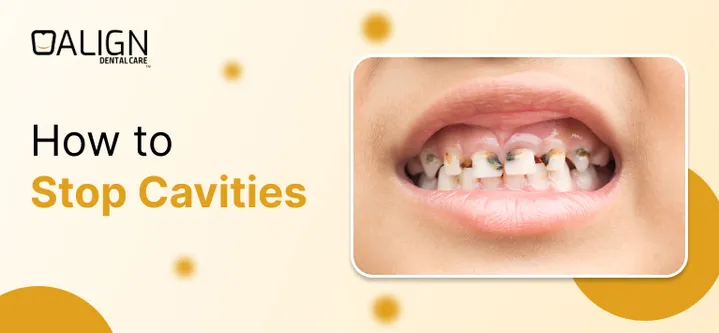
Cavities, or tooth decay, is another rare dental illness with which many people, including children, often struggle. They exist when bacteria invade the outermost layer of the teeth, known as the enamel, and bring about caries. Further, they include cavities, toothaches, and, in the worst-case scenario, the complications that may result from an infection. However, cavities can be prevented from forming or getting worse as long as some habits are incorporated and proper care is taken. In this blog, we will guide you through how to prevent cavities within the simplest, most actionable steps to put into practice. From instructions for prevention to techniques for preventing a small cavity from spreading, it has all the necessary information.
Understanding Cavities: What Are They?
Cavities are dental caries, or simply the holes in the teeth that result from the bacteria. If food remained on the teeth for some period, it changed into acid if it contained sugar or starch. This acid corrodes the enamel and wears it out to allow the formation of cavities on the surface of the teeth. As a result, they cause pain and infections, and in severe cases, you may end up losing your teeth.
Cavities: How Do They Develop?
The formation of cavities comprises three phases, which are:
- Plaque Formation: Plaque is another layer that forms on the surfaces of your teeth. It develops into a hard, firm layer of bacteria.
- Acid Production: Whenever you take foods that are rich in sugar or starch, the bacteria that form plaque will release acids.
- Enamel Damage: The acid dissolves and subdues your tooth enamel, and when it does that, it leaves holes, or what we refer to as cavities.
As for how cavities form, well knowing that can help prevent them fairly easily by changing some daily routines.
Ways to Stop Cavities from Forming
It is often said that an ounce of prevention is worth a pound of cure, and this cannot be truer than in the case of cavity diseases. The following are many simple yet effective ways to stop cavities from developing:
- Brush Your Teeth Regularly
Nevertheless, one of the simplest ways of avoiding cavities is brushing your teeth. Brush your teeth for a recommended 2 times a day, after waking up in the morning and before going to bed.
- Use Fluoride Toothpaste: Fluoride helps build up the enamel and ward off bacteria.
- Brush for Two Minutes: It is recommended that you should spend not less than two minutes brushing your teeth to cover every part of the mouth.
- Replace Your Toothbrush Regularly: Replace your toothbrush every three months or when the bristles are non-functional.
Brushing your teeth helps to remove food particles as well as bacteria. In turn, it minimizes the chances of the formation of plaque as well as cavities.
- Floss Daily
This is a very common technique that is usually considered a minor procedure, but without flossing, one can develop cavities. It also assists in cleaning those regions in between your teeth that a brush cannot reach.
- Reach Tight Spaces: This is because flossing makes it easier to eliminate plaque and food particles that may have been left in between the teeth.
- Prevent Gum Disease: It is worth noting that daily flossing will help you avoid gum diseases that may also lead to tooth decay.
Adopt the culture of flossing your teeth regularly so that you can keep cavities from attacking your teeth.
Healthy Eating Habits to Stop Cavities
Every meal you take plays a crucial role, especially in the health of your teeth. Some foods cause tooth decay, and others promote oral health. Here they are:
- Limit Sugary & Acidic Foods
Consumption of foods that are high in sugar and acid is a leading cause of tooth decay. These create conditions in which bacteria generate acid, which negatively impacts the enamel of the teeth.
- Watch Out for Sugary Drinks: Sweetened beverages such as soda, sports drinks, and even fruit juices contain a lot of sugar.
- Avoid Sugary Snacks: These include sweets such as candies, cakes, and cookies since they are rich sources of sugar and can lead to tooth decay.
- Limit Acidic Foods: Oranges, lemons, citrus fruits, vinegar, and other foods can cause damage to the enamel if consumed frequently.
To prevent cavities, reduce the intake of sugary and acidic foods in order not to encourage the formation of cavities.
- Eat Calcium-Rich Foods
Teeth are some of the key requirements needed in the human body, and calcium is important as it strengthens teeth. It also means that you can strengthen the tooth enamel and prevent cavities if you introduce calcium-containing varieties into your diet.
- Dairy Products: Calcium-rich foods include milk, cheese, and yogurt.
- Leafy Greens: Spinach and kale also contain a medium quantity of calcium in them.
Consuming such foods increases the density of teeth, thus making them harder to wear out by decay.
Dental Hygiene Practices for Cavity Prevention
Aside from brushing and flossing, below are a few more habits that can help you stop cavities in their tracks:
- Use Mouthwash
Mouthwash is useful for areas that the toothbrush and dental floss could not reach in some cases. It helps remove leftover food and bacteria.
- Choose a Fluoride Mouthwash: The fluoride gels aid in the rebuilding of the protective enamel surface of your teeth as well as offer protection from cavities.
- Rinse After Eating: Use mouthwash after a meal to prevent bacteria from sticking to the teeth.
Utilizing mouthwash can also be a part of the daily dental routine and helps to protect the teeth even more.
- Chew Sugar-Free Gum
If you chew sugar-free gum, the flow of saliva is likely to increase, thereby lowering the chances of cavities forming. Saliva aids in rinsing off the food particles out of your mouth and acting as a buffer to the acid in your mouth.
- Look for Xylitol Gum: Xylitol, on the other hand, is a naturally occurring sweetener that has proven to lower bacterial content in the mouth.
- Chew After Meals: For those times when you are unable to brush your teeth, chewing gum after meals will suffice for the cleaning function.
One of the simplest ways to maintain our teeth in good health during the day is by chewing sugarless gum.
- Regular Dental Checkups
To practice good dental hygiene, you need to see a dentist. Tooth scaling and polishings can also find cavities, and before they progress any further, professional treatment can be sought.
- Clean Every Six Months: Anyone who wants to clean their teeth and avoid cavities and other dental problems should go for a dental cleaning at least twice per year.
- Early Detection: In particular, small cavities are visible to dentists or can be diagnosed early enough before developing into severe ones.
Cavity prevention and hygiene maintenance call for regular dental visits to a dentist.
Treating Small Cavities Early
If you have a small cavity, you should treat it immediately to avoid developing a big one. The ways are:
- Fluoride Treatments
While in the initial form, little cavities do not seem to be a major problem. How? Fluoride treatment may help to remineralize the affected enamel.
- Topical Application: Your dentist may paint a fluoride varnish or gel on the affected tooth, too.
- Regular Use: Dental fluorides and good use of toothpaste and even mouthwash can also act to slow the process.
Early identification of cavities will help one avoid getting worse, such that they require extensive treatment methods.
- Dental Sealants
Dental sealants are coatings that the dentists paint on the pits and grooves of the back teeth. Specifically, they work as a shield against bacteria and acid.
- Preventative Measure: Most people advise using sealants on children, but adults can be helped by the sealants as well.
- Long-Lasting Protection: Sealants can last several years before one needs another treatment, and all this while they protect the teeth from cavities.
It can be used as a recommendation for people looking to prevent cavities with the use of sealants.
Final Thoughts
Prevention of cavities on the teeth is much better than seeking a remedy for them when they are formed on the teeth. With regular hygienic practice, a proper diet, and routine checkups with the dentist, you will be able to prevent tooth decay and cavities. Prevention, they say, is always better than cure, especially as it relates to our dental health. If you follow these measures, your teeth will remain healthy. Plus, you’ll never have to endure the pain of aching teeth and sensitivity to cold food and drinks—for the rest of your life!





